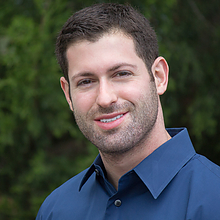Goldstein Brings Expertise in Machine Learning to UMIACS

A new UMIACS faculty member brings extensive knowledge in machine learning to the University of Maryland, and plans to share this expertise with other researchers both on and off campus.
Thomas Goldstein, an assistant professor of computer science, says his main focus is on developing and refining fully automated systems for machine learning and model fitting.
Many scientific applications rely on massive datasets that must be stored in a cloud, including medical/satellite, image databases, astronomical records and more. By improving these systems, scientists can analyze datasets in a distributed setting without the need for customized systems. Similar methods can be applied to small-embedded systems—such as in wireless communications—where power efficiency and simplicity are a must.
One area that Goldstein is working on involves the problem of fitting machine learning models—such as support vector machines that can quickly analyze data and recognize patterns—to large distributed data sets. Methods for solving these types of problems in a distributed way require the user to turn a series of “knobs”—the user must decide on step-size parameters, the granularity level of parallelization, stopping conditions, and regularization parameters.
In order to make the process flow better, Goldstein is interested in self-adaptive methods that allow algorithms to tune themselves for optimal performance by learning optimal parameter choices as they run.
Goldstein currently has several collaborative projects underway.
He is working with Rich Baraniuk at Rice University on low-complexity kernel methods in machine learning, and also collaborates with Gavin Taylor at the U.S. Naval Academy on cloud computing and distributed model fitting using splitting methods.
Closer to home, Goldstein is studying problems related to automated systems for distributed optimization with UMIACS faculty member Amol Deshpande and former UMIACS researcher Lise Getoor.
“Working with UMIACS has been a great experience,” Goldstein says. “Through UMIACS, I have met numerous potential collaborators in other departments, and the technical staff have been incredibly helpful at connecting me with the computing resources I need for research.”
He joins UMD from a postdoctoral fellowship with the Department of Electrical and Computer Engineering at Rice University. He has also served as a postdoctoral fellow at Stanford University, and as a data scientist for the Washington University School of Medicine.
Goldstein received his doctorate in applied mathematics from UCLA in 2010.
- Melissa Brachfeld
